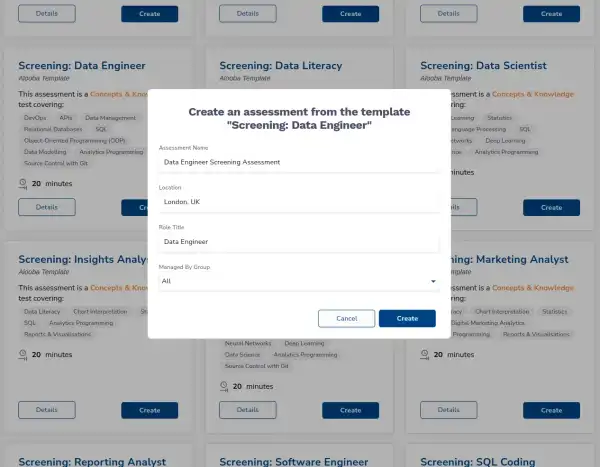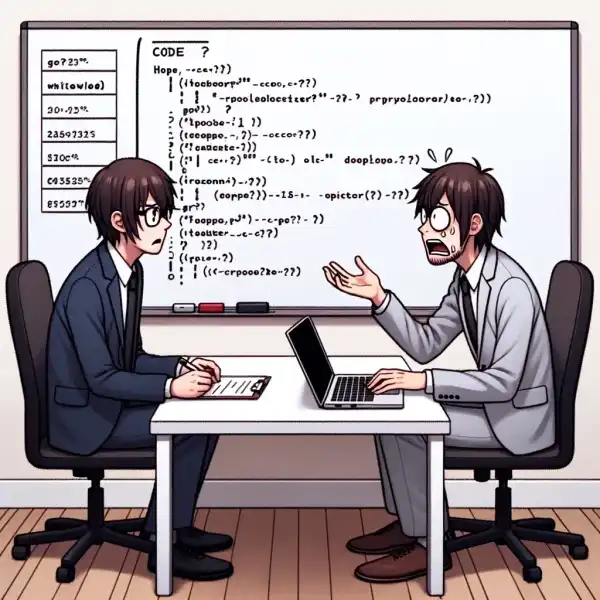Alooba Validates Skills Automatically for Mike Yates at BPS
Hire Faster
I wouldn't dream of hiring somebody in a technical role without doing that technical assessment because the number of times where I've had candidates either on paper on the CV, say, I’m a SQL expert or in an interview, saying, I'm brilliant at Excel, I'm brilliant at this. And you actually put them in front of a computer, say, do this task. And some people really struggle. So you have to have that technical assessment.
Mike Yates is an analytics veteran and heads up the data & analytics function at The British Psychological Society. Yates first experienced Alooba as a candidate, and was impressed by how insightful the results were to him. When he started hiring at BPS, he was time poor and realised he wouldn't have bandwidth to read 100s of CVs, interview loads of candidates or create & manage his own test.
He also knew that BPS couldn't offer market leading rates, so he had to run a lightening fast hiring process, to get an offer into candidates' hands faster than his competition.
With Alooba he was able to easily test all of his candidates as soon as they applied for his open roles. With no clunky take-home test, candidates weren't bogged down in a long-winded process. By screening candidates based on skills, Yates avoided endless interviews with candidates who talked the talk but couldn't walk the walk.
Yates quickly scaled his team from 0 to 6 over a few months, using Alooba.
The British Psychological Society is the leading representative body for psychologists in the United Kingdom.

Tough competition for talent
In the 3rd sector, recruitment can be especially challenging. Lacking a strong employer brand and without the high salaries on offer in tech & finance, 3rd sector organisations have to recruit smarter, not harder.
As a small organisation, the salary we can offer isn’t market leading. We had to think about how else we can streamline our recruitment process to try and give us as much of an advantage as we can.

Time is of the essence
Yates realised that while they might not be able to offer the highest salaries, what they could do was compete on speed. Getting an offer into the hands of the right candidate as soon as possible would give them a real chance of securing some top talent.
So what we wanted to do is to go for a really quick process. So from receiving a CV to finally making an offer, we wanted to make that as easy for the candidate as possible and as quick as possible, reducing the chance of good candidates finding another role or having multiple offers on the table.
Hiring fast and being first to market sounds great, but how was Yates actually going to achieve this?

Enter Alooba
Like a lot of Alooba customers, Yates’ first experience of the Alooba platform was actually as a candidate for another role. What he experienced impressed him.
I first heard about Alooba, but as a candidate. I applied for a couple of roles, one of which used Alooba and it was an assessment and I thought it was a great experience because you can understand more about the role, because you can see what they're looking for, and also you get the instant feedback. So you know straight away one external view of how the market might perceive you. So I found that really useful.

Why not just create their own test?
Like lots of hiring managers, Yates had previously created his own manual take-home tests for candidates. But he realised how time-consuming it would be to embark on this and how clunky and difficult these tests can be for his team and the candidates alike.
Traditionally, we've done that in-house, so we've taken the time to build and design a test and then administer that test - that's now time that I don't have.
Building a take-home test takes on average ~30 hours to do. Check a comparison of using Alooba vs building your own test.
Yates also realised that if he was going to build out a new team of 6, he’d need to go beyond his own skills & knowledge when hiring.
The skills I'm looking to recruit for - you know, I want to find a data manager that's better at data management than I am. I want to find a data engineer that's better at data engineering than I am, so hence I need some support to design those tests.
One of the big upsides of moving to a platform like Alooba is being able to leverage the skills of 50+ experts who’ve created the Alooba assessment question content. With 3500+ questions across 50 different skills, all created & peer-reviewed by experts, you’ll be able to find the support you need to ensure you hire the right candidate.


Hiring fast, but still hiring right
Optimising for speed gave Yates an advantage, but he was also wary of making the right hire. He was well-aware of the limitations of CVs and taking candidates at face-value. With a lack of technical skills being the leading cause of bad hires, Yates was keen to avoid this pain again.
I wouldn't dream of hiring somebody in a technical role without doing that technical assessment because the number of times where I've had candidates either on paper on the CV, say, I’m a SQL expert or in an interview, saying, I'm brilliant at Excel, I'm brilliant at this. And you actually put them in front of a computer, say, do this task. And some people really struggle.

Easy to get started
With Alooba’s role-based templates, you can literally get started testing in 2 clicks.
What I like about it is that there's loads of off-the-shelf assessments that you can use. So if you are really time-poor, you can literally get an off-the-shelf, e.g. here’s a data engineering assessment.
The simple to use templates help you get started easily, but Yates - like a lot of hiring managers - was keen to ensure he got the set-up exactly right for what he needed in his roles. So he was able to tweak the data engineering template to suit his specific hiring needs.


Unlock interview time
By having a really thorough technical skills assessment, Yates found he was able to unlock interview time to focus on softer skills.
It frees up time in your interview to focus on other things…I basically used the assessment to test one half of the role, which was quantitative data analytics and then that enabled me to focus on just using the interview to dive into the other side (softer side) of the role in just the interview.

Separating the wheat from the chaff
Alooba helped Yates to not only filter out the blaggers, but also highlight hidden gems that they otherwise would have rejected, based on their CV alone.
Yes, that worked really well, what I envisaged is what I've seen in terms of, a candidate saying, "I'm fantastic at this", "I'm amazing at that", and then not performing particularly well on the test. And then equally we've had a couple of CVs that looked okay - but didn't stand out - that have actually gone on to perform well on the test, and those candidates we’ve put through to interview.


Interviews just aren’t set-up to evaluate technical skills
Sometimes hiring managers try to evaluate technical skills in an interview, but it tends to be quite time consuming and doesn’t allow the candidate to demonstrate the skills in the way they’d actually use them on the job.
I've been in some interviews where I've been asked to do that on the fly and it's quite challenging because when you're writing code, you don't say it out loud to a person, you write it down, you look at it, you edit it, and that's assessing someone in the way they'll do the role rather than something different.

Widening the funnel
Part of the challenge of the traditional CV-based approach is that it’s very unscalable and you have to just base screening decisions on the CV. If it doesn’t stand out, you just can’t take the punt on the candidate and interview them. But with an automated screening assessment in place, Yates now had a way to broaden the funnel and give many more candidates a fair chance.
We had over 100 candidates. And what I was doing is trying to open the funnel really quite wide, rather than just looking at kind of the top handful of CVs, I was able to then say, well, let's open it up.
So, whether you’re at a 3rd sector organisation like BPS, a large enterprise, high growth tech company, or one-person band, Alooba can help you hire faster & smarter.




